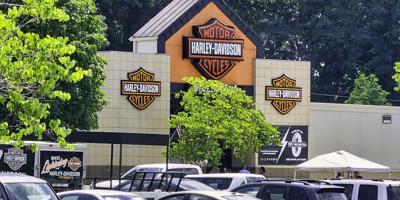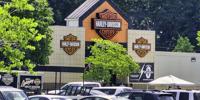
Harley-Davidson dealership
CHICAGO - A federal appeals panel has agreed motorcycle owners can’t sue Harley-Davidson over a policy that limits warranty coverage for the installation of aftermarket, off-brand products.
More than a dozen Harley owners sued the iconic motorcycle maker, alleging violations of the Magnuson-Moss Warranty Act. The consolidated complaints claim bike owners were forced into paying a higher cost for Harley parts and accused the company of procedural violations in dealing with customers.
U.S. District Judge William Griesbach, of the Eastern District of Wisconsin, granted the company’s motion to dismiss the complaint, prompting a challenge to the U.S. Seventh Circuit Court of Appeals. Judge Thomas Kirsch wrote the majority opinion, filed Aug. 15; Judges John Lee and Thomas Kolar concurred, while Lee wrote a partial dissent.
According to Kirsch, about 15% of Harley’s revenue comes from parts sales. Although “there is a robust marketplace of suppliers offering parts and accessories compatible with Harley-Davidson motorcycles,” the company itself is “the largest supplier of parts compatible with its motorcycles.”
Kirsch also noted a 2022 Federal Trade Commission complaint alleging violation of the same federal law, “by unlawfully conditioning its limited warranty on the exclusive use of Harley-Davidson parts and accessories and by failing to properly disclose all the terms of its warranty in a single document. Harley-Davidson settled with the FTC and entered into a consent decree that required the company to change its warranty practices.”
The panel said Harley’s warranty language cautions against actions that may void a warranty. And while some parts of the warranty contain express terms, such as those dictating initial service and scheduled maintenance, the statements informing the consolidated complaint “lack such unambiguous language.” It further noted the FTC’s complaint isn’t a statement of violation but a determination the agency should investigate an issue.
Kirsch further pushed back on the allegation of a deceptive implication that warranties are only valid if bike owners use Harley parts. Despite owner’s manual phrases like “Use only Harley-Davidson approved parts and accessories” and “Insist that your authorized Harley-Davidson dealer uses only genuine Harley-Davidson replacement parts and accessories to keep your Harley-Davidson motorcycle and its limited warranty intact,” Kirsch said the implication claim fails among the broader context of the manual and limited warranty.
“The warranty said that Harley-Davison would not cover defects or damage caused by parts or accessories that weren’t approved, or damage caused by non-Harley-Davison components,” Kirsch wrote, noting that’s the type of disclaimer the law authorizes.
The complaint also alleged Harley’s limited warranty doesn’t include required disclosures, but Kirsch said there’s no articulation of what applicable terms aren’t “fully and conspicuously disclosed” and general warnings to consult with local dealers algin with FTC regulations. The majority also rejected an argument that Harley-Davidson doesn’t give proper warranty signs to dealers, noting there are several ways to comply with a rule that customers be entitled to review warranty terms before a purchase, such as the documents posted to the company website or hard copies available to buyers.
Turning to antitrust and monopoly claims, Kirsch noted that while Harley dominates Indian, the No. 2 domestic motorcycle manufacturer, it controls only about 20% of the overall American market, undercutting accusations that “are more consistent with a single-brand submarket than an American-made submarket.” Though the complaint claims some people will only buy American-made bikes, there is no suggestion such customers “comprise an identifiable, discrete subset of consumers that can be similarly exploited via price discrimination.”
Lee said he joined with most of the majority opinion, primarily the affirmation of Judge Griesbach’s dismissal of the Magnuson-Moss disclosure claims. He split on the question of whether “Harley-Davidson violated state antitrust laws by attempting to monopolize the market for Harley-Davidson aftermarket parts,” saying he agreed only that the complaint didn’t allege the company has “a dangerous probability of achieving monopoly power” and not with the majority’s position on market power.
As such, Lee said the complaint adequately alleged Harley improperly conditioned warranty coverage on the exclusive use of name brand parts and said the antitrust allegations should survive because the majority should’ve given more heft to the complaint’s position on the market for American-made motorcycles.
“Harley-Davidson dealers were denying warranty coverage, claiming that customers were using unauthorized parts,” Lee wrote, noting further allegations that “dealers were economically incentivized to do so because non-warranty repairs get reimbursed immediately, whereas dealers had to ‘wait up to 90 days to be compensated’ for warranty repairs.”
Lee said the majority should have drawn inferences in favor of the customers, but instead focused on manual passages with “softer, more ambiguous language” that he later said “cannot support the weight the majority places on it.”
That was similar to his reason for endorsing the complaint’s market definition, saying a decision at the dismissal stage needed to give more weight to “the complaint’s well-pleaded factual allegations.” Lee said the proper outcome was reversal of the district court dismissal and remand for further proceedings.
Plaintiffs were represented in the legal action by attorneys Thomas H. Burt and Lillian R. Grinnell, of Wolf Haldenstein Adler Freeman & Herz, of New York; and Julian Diamond, of Bursor & Fisher, of New York.
According to the online court docket, the plaintiffs have moved to undo the decision, filing a request for the entire Seventh Circuit court to hear the case en banc, meaning before a panel of 11 judges, rather than three.
Harley-Davidson has been represented by attorney Cody D. Rockey, of the firm of Dykema Gossett, of Ann Arbor, Michigan.






